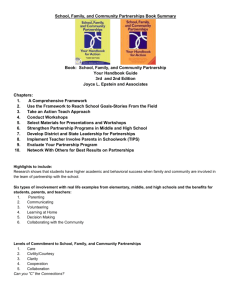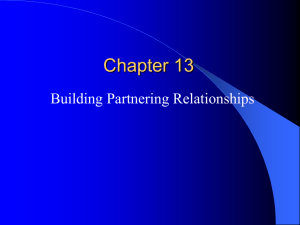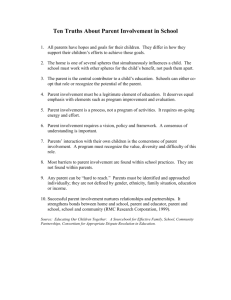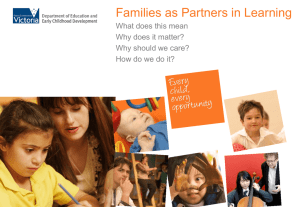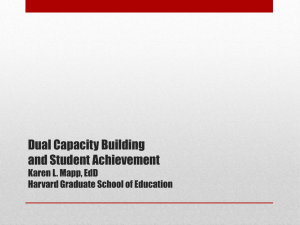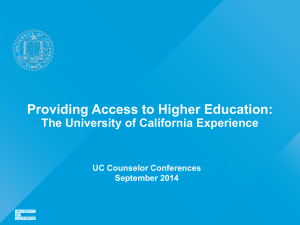annual_conference_2013
advertisement
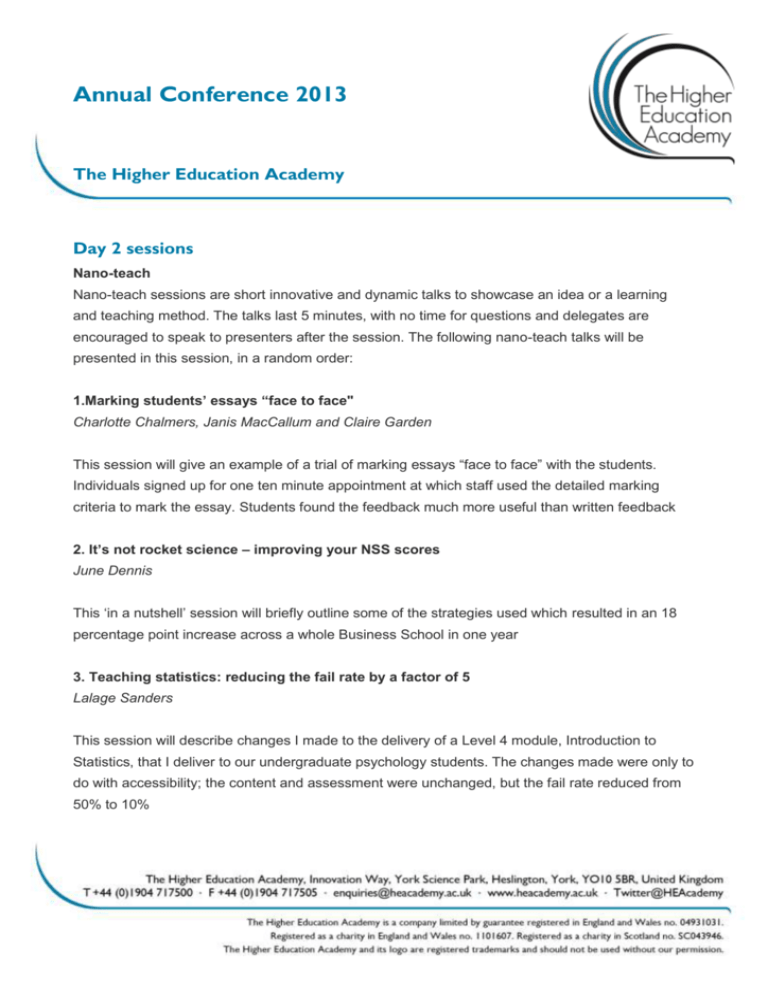
Annual Conference 2013 The Higher Education Academy Day 2 sessions Nano-teach Nano-teach sessions are short innovative and dynamic talks to showcase an idea or a learning and teaching method. The talks last 5 minutes, with no time for questions and delegates are encouraged to speak to presenters after the session. The following nano-teach talks will be presented in this session, in a random order: 1.Marking students’ essays “face to face" Charlotte Chalmers, Janis MacCallum and Claire Garden This session will give an example of a trial of marking essays “face to face” with the students. Individuals signed up for one ten minute appointment at which staff used the detailed marking criteria to mark the essay. Students found the feedback much more useful than written feedback 2. It’s not rocket science – improving your NSS scores June Dennis This ‘in a nutshell’ session will briefly outline some of the strategies used which resulted in an 18 percentage point increase across a whole Business School in one year 3. Teaching statistics: reducing the fail rate by a factor of 5 Lalage Sanders This session will describe changes I made to the delivery of a Level 4 module, Introduction to Statistics, that I deliver to our undergraduate psychology students. The changes made were only to do with accessibility; the content and assessment were unchanged, but the fail rate reduced from 50% to 10% 4.1.1. Paper presentation (20 minutes) e-Gothicist: students as partners in the learning process Ben Brabon This paper introduces e-Gothicist – a web-based educational resource for Gothic scholars funded by the HEA Teaching Development Grant scheme. Outlining it pedagogical rationale, it summarises how it utilises technology to promote flexibility in the delivery of learning in order to enhance the quality of student performance. Drawing upon initial data from the pilot study, it demonstrates how the role of students as partners – including peer feedback and student mentoring – has been central to the process of quality enhancement. 4.1.2 Paper presentation (20 minutes) Student academic partnerships within the Law School at Birmingham City University Emma Flint This session, led by students and a senior academic from the Law School at Birmingham City University showcases and critiques current student & academic partnership (SAP) projects. These SAP projects involve student peer careers mentoring and student led research based projects examining issues of employability and use of social media. 4.1.3 Paper presentation (20 minutes) Students as educators and mentors; increasing awareness of the benefits and participation in sandwich placements Ruth Brooks Completing a sandwich placement increases the probability of gaining employment upon graduation; however, the number of students participating is decreasing nationally. Former placement students are used to educate and mentor second years through the placement application process to raise awareness of the benefits, share their experience and increase participation rates. 4.2.1 Paper presentation (20 minutes) Organisations as collaborators Jo Morrison and Leanne Manfredi Drawing on findings from our three year collaboration, this informal session shares insights and practical recommendations for valuable HEI-Museum partnerships that have student experience and public engagement at its core. You will learn of different models to inspire your own collaborative activities, and be invited to share your individual experiences and vision. 4.2.2 Paper presentation (20 minutes) HE knowledge-transfer projects: developing applied drama activities in partnership with NHS Persephone Sextou The paper aims to share experience from a 3 year partnership between Newman University Drama department and NHS Trust. It presents the development of a knowledge-transferred, empirical-led research theatre project and aims to discuss the effectiveness of involving volunteer drama students in research with professional organizations on enhancing informed curricular learning. 4.2.3 Paper presentation (20 minutes) Parliamentary studies – a partnership with parliament Naomi Kent The new ‘Parliamentary Studies’ module from the Houses of Parliament will be taught at 13 universities from September 2013 through a flexible partnership between academics and Parliamentary officials. We will outline how the partnership works with different universities, and explain how the involvement of Parliament as a partner delivers a unique student experience. 4.3.Discussion session (1 hour) The impact of the UKPSF Nigel Purcell, Nancy Turner, Rajesh Dhimar, Martin Oliver, Liz Shrives and Frances Deepwell Key aims: outline the rationale of the impact study; provide a brief overview of the methodologies used; present a summary of the key findings and; discuss and contextualise key recommendations The session will combine short presentations with group and plenary discussions. 4.4 Discussion session (1 hour) Engaging students in quality assurance and enhancement: models and options Graham Gibbs and Yaz El Hakim The University of Winchester has engaged one student on each degree programme to undertake pedagogic research and development, linked to annual course review. This session will outline this initiative, invite participants to outline their own institutional practices to engage students in teaching improvement, and discuss the various extant models. 4.5 Discussion session (1 hour) Actively Engaging Students to enhance Institutional Approaches to Learning Co-ordinated by Higher Education Academy funded doctoral students There is significant potential for working with students to support transformative change in their learning experiences. This facilitated discussion focuses on what student engagement means to individuals, and what can be done to enhance student engagement. It is aimed at individuals hoping to develop new networks in this area. 4.6 Panel session (1 hour) Creating partnerships with impact Paul Manners, Stephen Hill, Maggie Leggett and Jane Clark With increasing demands on universities to evidence the impact of their research, to provide relevant teaching and learning, to address social mobility, and respond proactively to the economic crisis, partnerships are under pressure. The panel will explore perhaps the biggest strategic challenge currently faced by universities – developing mutually beneficial partnerships with wider society. 4.7 Workshop session (1 hour) In their own words: engaging with employers’, students’ and staff’s views of graduate attribute Krista DeLeeuw This workshop will build on the ‘employers as partners’ strand to explore how employers view graduate attributes, in comparison to academic staff and students. The activity is based on the work we have been carrying out in the HEA-funded project Bringing Graduate Attributes to Life. 4.8.1 Paper presentation (20 minutes) Working towards co-creation of academic development initiatives: experience in a small institution and some emerging principles Corinne Boz, Meg Tait and Laurence Bargery This paper examines the process of designing and delivering a ‘co-created’ academic development programme for a cohort of first-year undergraduates. Using contextual data, it analyses key conceptual and practical challenges of the model, from both staff and student perspectives and explores the idea of a continuum of co-creation. 4.8.2 Paper presentation (20 minutes) Bridging the Languages Divide – Peer Mentoring for Language Learning Eleanor Loughlin and Laura Leonardo This paper presentation will explore the role of peer mentors in supporting postgraduate and early career language learners at Durham and Newcastle universities. It will present feedback from mentors, mentees, language tutors and project organisers in order to explore the challenges and value of the scheme. 4.8.3 Paper presentation (20 minutes) Empowering bioscience students to develop employability skills through volunteering – narrative voices of partnership Sheila Cunningham, Deeba Gallacher and Orkide Tunch This presentation will be lead by a lecturer and students and focuses on a project from a HEA teaching development grant which investigated and developed health related volunteering opportunities in partnership with students specifically to maximise employability skills for biomedical science undergraduate students in a North London university. 4.9 Discussion session (1 hour) Walking the walk: beyond talking the talk of students as partners Sarah Ingram, Nicola Poole and Student From Students As Partners Workstrand This session will aim to share the experience of the HEA Students as Partners work strand, one of three work strands of the Future Directions for Higher Education in Wales quality enhancement theme programme. It will focus on the participants’ experiences of working with students as partners and explore through discussion with participants whether there have been similar insights of partnership working. 4.10 Discussion session (1 hour) Student attitudes and skills in sustainable development – outcomes of a three year longitudinal study by NUS and HEA Simon Kemp and Jamie Agombar This session will present the findings of a three-year longitudinal study investigating student attitudes and skills in the increasingly important area of sustainable development in the higher education sector. The responses of different year groups are assessed at each study point of 2010, 2011, and 2012. 5.1.1 Paper presentation (20 minutes) Facilitating the co-evolution of HE people, practice, tools and services through participatory design thinking with staff, students, service providers and employers Robert O'Toole To demonstrate how we can use Participatory Design Thinking to prime and facilitate innovative design change by making it easy for people to work together as co-designers. To show how this can ensure equitable, transferable, sustainable development in HE. 5.1.2 Paper presentation (20 minutes) Artworld101 - adventures in crowdbuilt collaborative educational environments and questions around who 'owns' learning Rachel Dobbs Artworld101 is an experimental task-led research project that utilizes online and face-to-face spaces to develop collaborative user-generated content. Students and lecturer are positioned as partners in the shared endeavour of generating and disseminating knowledge - questioning who ‘owns’ learning and continually challenging ‘what is important’ in the studied discipline area. 5.1.3 Paper presentation (20 minutes) Student authored vignettes Simon J. Lancaster, Simon Child and Jo Bruce The term vignette refers to interactive multimedia teaching packages derived from screencasts. We will report upon a TDG-funded project to enable production of vignettes from revision presentations by final year MChem students. The background to the chemistry vignettes will be outlined and the extent of facilitating support summarised. 5.2 Discussion session (1 hour) How can we recognise excellence in teaching and learning? A transnational collaboration Annette Cashmore, Chris Cane, Craig Bartle, Sandra Wills, Christine Brown, Anne Melano, Jan Sullivan, Stephen McHanwell, Sue Robson, Elaine Hall, David Sadler, Sara Booth, Cassie Saunders We will introduce key aspects of both processes and outcomes from this international project focussed on promotions and the recognition of teaching for the modern academic role. The session will focus on facilitated discussion of how excellence in teaching can be identified, rewarded and developed in different higher education contexts. 5.3 Discussion session (1 hour) Planning and partnerships for a major incident simulation experience Jennifer Obbard, Gerri Nevin and Adrienne Jemmett This session is an interactive discussion of how local organisational partnerships contributed to the development & quality of student learning & experience in an Interprofessional Major Incident Simulation. The materials are an open resource and participants will discover how they can incorporate this kind of learning event for their students. 5.4 Discussion session (1 hour HEA Ron Cooke International Scholars – Interactive discussions HEA-funded international scholars This session will provide delegates an opportunity to meet the HEA International Scholars, to discuss the challenges of learning from other Higher Education learning environments, the value of such projects for developing learning and teaching policy and practice within the UK, and to discover the findings of the current scholars. 5.5.1 Paper presentation (20 minutes) New ventures in educational partnerships Sally Pulvertaft and Sarah Caton Creating a powerful partnership with an organisation which has complementary services and expertise to yours is one way to accelerate your strategy whether that’s transforming your campusbased courses or launching new distance learning programmes. In this session Sally Pulvertaft from Leeds Metropolitan University we will share her experience of partnering with Pearson. 5.5.2 Paper presentation (20 minutes) Personalisable, distributable learning designs: a collaborative adventure Shane Sutherland, PebblePad Innovative use of portfolio technology throughout the user community has resulted in powerful new learning designs to support institution-wide learning with a personal approach. The session will share a wide range of institutional examples, encouraging delegates to reflect on how this innovation could impact on their own curriculum design. 5.5.3 Paper presentation (20 minutes) Supporting employability with knowledge Newell Hampson-Jones Is embedding ‘employability’ in to curriculums just a bureaucratic tick box exercise or can the concept be harnessed and used to deeply improve students’ learning? BSI’s Education Sector Representative Newell Hampson-Jones discusses how contextual understanding of knowledge tools can not only improve students’ post-graduation employability, but also engage them more deeply in course content. Explore how fresh perspectives can translate formal and traditional concepts and unlock the potential within students to innovate. 5.6.1 Paper presentation (20 minutes) E-mentoring as a unique educational opportunity to improve graduate employment opportunities Andrea Wheeler, Simon Austin and Jacqui Glass Can e-mentoring provide international engineering and construction students with an educational opportunity which will significantly improve their employment opportunities? This paper addresses both the difficult employment market for graduates and the challenges arising from increased internationalization within HEIs through an e-mentoring initiative set up funded by a HEA departmental grant. 5.6.2 Paper presentation (20 minutes) International professional mentoring scheme Chandana Sanyal and Chris Rigby A Paper Presentation on the key research findings of an International Professional Mentoring Scheme which partners overseas employers as mentors with post graduate UK students as mentees to widen student engagement and creates an alternative experience to learn about international work practices and enhance their employability 5.6.3 Paper presentation (20 minutes) Mentoring students into employment - 1+1 >2 Jenni Jones This session aims to share learning from our 3rd year student mentoring scheme, whereby students are mentored by an Institute of Directors member. The key objectives are to discuss the learning achieved for students, mentors and the University, to share the successes and to offer ideas on mentoring best practice. 5.7 Workshop session (1 hour) The creative graduate Richard Sant and Natalie NortonIn this workshop participants will have the opportunity to take a creativity self-measure which has been designed in collaboration with regional graduate employers. Follow-up discussions will explore the use of this with students and its context as a tool to develop employability. 5.8.1 Paper presentation (20 minutes) Redefining engagement; students as partners, shapers and leaders of a 21st century student experience Ngaere Blair How students engage with their institutions and their learning is undergoing significant change; time commitments, online delivery, and cost pressures are just some of these challenges, while new generations of learners are deeply concerned about the future of higher education; its relevance, value and quality. This session explores new approaches and strategies for engaging students as active contributors, shapers and leaders of a 21st century student experience. 5.8.2 Paper presentation (20 minutes) SALTSOC – a student designed online peer network - a journey from Induction to PDP and beyond Nicola Poole and Sophie Leslie The project presented has evolved from its initial focus to enhance the induction phase of the course by the redesign of the first week by staff and students, to the design and implementation of a student led online peer support network. Discussing the benefits and barriers staff and students faced. 5.8.3 Paper presentation (20 minutes) Rethinking the teacher’s role for building authentic learning partnerships: learning from an experiment in student-driven large group teaching Dorothy Spiller and Glenys Forsyth This paper argues for learning experiences which are directed by the students and evaluates a case study of a teaching initiative in which students determine the lecture content. This case study is used to suggest principles and practices that can contribute to genuine learning partnerships between students and the teacher. 5.9 Workshop session (1 hour) How do postgraduate research students interpret what we ask in the PRES? Lorenzo Vigentini and Barry McCluckie The Postgraduate Research Experience Survey (PRES) is currently offered to all HEIs in England, Scotland, Wales and Northern Ireland. About 100 HEIs currently take part providing an opportunity to find out what their PGR students think about their experience. Although Institutional results are confidential, the central organisation from the HEA allows to aggregate the results nationally and according to six smaller benchmarking clusters. The aim of this session (or workshop) is to present the methods and results of a project which explored the validity of the items used in the PRES. A set of recommendations have been proposed to review the PRES for 2013, however the conference provides an opportunity to share the experience and detailed results. 5.10 Discussion session (1 hour) Partners in curriculum change: what are the best ways of working with students as co-researchers in assessment and digital literacies? Anne Jones, Maria Papaefthimiou, Amy Barlow, Camille Shepherd Participants in this discussion session will explore approaches to working with students as coresearchers in technology-enhanced practice in assessment and digital literacies. Three JISCfunded projects offer a sounding board for discussion around best practice, enabling delegates in other institutions to build on and participate in this body of work. 6.1 Panel (1 hour) Learning partnerships for sustainability – building bridges for curriculum innovation Alex Ryan This session explores the development of sector partnerships to progress Education for Sustainability (EfS) in HE through quality assurance and quality enhancement. It builds on a HEFCE funded sector project that worked closely with QAA and aligns with research by the HEA and NUS on demand and needs in this area. 6.3 Discussion session (1 hour) For who’s a jolly good fellow! – towards multinational teaching fellowship collaboration Kirsten Hardie and Earle Abrahamson This session aims to elicit high level discussions around collaborative partnerships between different teaching fellowship organisations, and how these partnerships provide opportunity for engagement with international communities of practice. The session further aims to understand the impact of teaching fellowship on teaching and learning development. 6.4 Workshop session (1 hour) Defining Peer Led Team Learning International Society (PLTLIS) Ellen Goldstein West, Jose Alberte, Alberto Cruz PLTLIS members in the US and the UK are collaborating in peer led team learning. The society offers content, research, best practices and a website http://pltlis.org . The workshop will provide an overview of the PLTL model, focus on training and involve participants in a peer leader training activity. 6.5 Discussion session (1 hour) Inernational students as consultants: developing the client relationship Liza Pybus This discussion session aims to explore the management of client expectations when engaging Postgraduate Business and Management students in team based project work with international students. The objectives are to both share our practice at Nottingham Business School and explore the management of client relationships at other institutions. 6.6.1 Paper presentation (20 minutes) Networking – powerful partnerships in action Christine Fountain Aim: To share we have established and sustained new employer partnerships through the development of a Human Resources employer network.Objectives: Highlight the way in which such networks might be formed and sustainedShare the learning from this experience Demonstrate the value such networks can provide to the HE environment and the student experience. 6.6.2 Paper presentation (20 minutes) Enhancing engagement and employability: A unique partnership with LSBU marketing alumni Anita Peleg and Mel Godfrey A unique partnership with LSBU Marketing Alumni facilitates strong industry links, job opportunities and internships, a network of guest speakers and contribution to academic research, curriculum design and delivery. Sharing research and experience of this initiative and inviting participant contributions, this session assesses the successes and challenges of alumni partnerships. 6.6.3 Paper presentation (20 minutes) Encouraging transference of skills from doctoral study to the workplace Hilary Burgess, Jerry Wellington and Gordon Weller This presentation considers the strategies, skills and processes by which doctoral students effectively transfer research outcomes to their work setting. Data is drawn from on line questionnaires, and face-to-face and telephone interviews with both employers and students. 6.7 Workshop session (1 hour) Students as active partners in supporting the assessment and learning of themselves and their peers Stephen Rutherford, Sheila Dargan and Andrew Shore The aim is to investigate the potential for involving students as partners in supporting their peers’ learning, either through curation of open-access resources or by development of their own learning resources. The workshop will investigate means by which this may be done as part of a module’s assessment strategy. 6.8 Discussion session (1 hour) Students as partners in academic staff development Rachel Hudson, Enzo Rossi and Susan Gibbs Helping lecturers new to teaching see things from their students’ perspective can be a powerful means of enhancing their practice. This session focuses on benefits, impact and lessons learned from a discussion exercise between students and staff new to teaching at the University of Portsmouth organised by the students. 6.9 Workshop session (1 hour) Empowerment through student-led design of teaching, assessment and feedback practice Sivaramkumar Shanmugam, Chris Seenan, Jamie McDermot, Jennie Stewart, Katie Thomson, Larissa Kempenaar, Lesley McAleavy, Kevan Gartland and Karen Thomson Empowering students to become independent life-long learners isa necessary preparation for employability. Glasgow Caledonian University has a range of initiatives focussed on empowering students to develop essential graduate attributes. A key principle in achieving these outcomes has been the engagement of students as partners. 6.10 Discussion session (1 hour) Student-led assessment: who needs lecturers anyway? Tina Bass and Leanne Demain This workshop session will introduce an activity from a student-led assessment delivered as part of an innovative Masters programme. The introduction of this assessment has enhanced a programme that already has students taking considerable control and responsibility for their learning. Further developments to enhance student learning are now sought.
